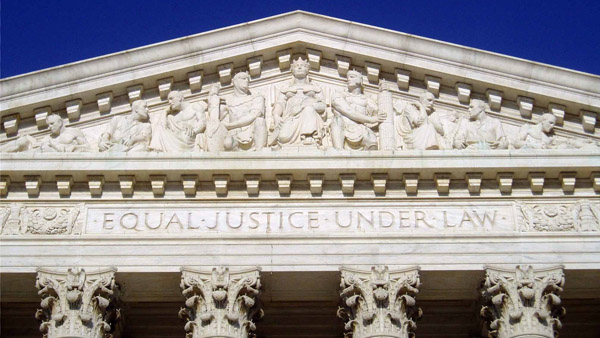The Kentucky's Supreme Court has issued a sharply divided ruling against the warrantless use of cellphones as tracking devices by police

FRANKFORT, Ky. (AP) — A sharply divided Kentucky Supreme Court ruled Thursday that police violated a robbery suspect's constitutional protections by accessing his cellphone without a warrant, calling use of the phone as a tracking device “profoundly invasive."
In the 4-3 decision, the court’s majority said the robbery suspect was subjected to a warrantless search when police obtained his real-time cellphone location information. They ruled that the information was illegally acquired and should be excluded from evidence.
At issue was whether there's a “reasonable expectation of privacy" regarding a person's real-time cell-site location information, also known as CSLI, under federal Fourth Amendment protections against unreasonable searches and seizures. Such information can be used to determine a cellphone's location with “near perfect accuracy” when the phone is powered on, the court noted.
“In obtaining an individual’s cell phone’s real-time CSLI, police commandeer the cell phone and its transmissions for the purpose of locating that individual,” Chief Justice John D. Minton Jr. said in writing for the majority. “We find this usurpation of an individual’s private property profoundly invasive, and we liken it to a technological trespass.”
The ruling stems from a case in Kentucky's Woodford County involving robbery suspect Dovontia Reed. One of his attorneys hailed it a far-reaching victory for civil liberties.
“This is kind of a guarantee from the court saying that the government can’t search your real-time CSLI to get your location without a warrant," said Adam Meyer, a public defender representing Reed during his appeals. "And what that means is this will protect everybody who has a cell phone now.”
The state attorney general's office didn't immediately respond to an email seeking comment.
Reed had called an acquaintance on his cellphone, saying he had run out of gas and asked that they meet at a Versailles gas station. When the acquaintance arrived, Reed allegedly robbed him of $500 at gunpoint and fled in a vehicle, according to authorities. Police obtained the number of the cellphone used by Reed.
The cell service provider located the phone and authorities used the information to track Reed's movements, the opinion noted. Reed was pulled over and arrested, and a grand jury indicted him on charges of robbery, possession of a handgun by a convicted felon and receiving stolen property.
Reed claimed police unlawfully obtained the cellphone location information without a warrant. A judge denied his motion to suppress the information and evidence gained from the search. He entered a conditional guilty plea to charges including second-degree robbery, reserving his right to challenge the denial of his motion. He was sentenced to prison about five years ago but has since been released on parole, Meyer said.
On appeal, the state Court of Appeals said the obtaining of Reed's real-time cellphone location information amounted to a warrantless, unreasonable search. The Supreme Court's majority agreed, sending the case back to trial court for further proceedings to suppress the cellphone data.
“Today we hold that individuals have an objectively reasonable expectation that their cell phones will not be used as real-time tracking devices through the direct and active interference of law enforcement,” Minton wrote.
He wrote that searching a cellphone's contents is an invasion of a person's “reasonable expectation of privacy sufficient to merit Fourth Amendment protection.” The Court of Appeals said the Fourth Amendment requires a warrant to search a person's cell-site location information.
“We find no reason why such an expectation of privacy would not extend to data unwittingly, involuntarily transmitted by a person’s cell phone to their cell-service provider regarding their location,” Minton said. “Police may not subvert the warrant requirement merely by going directly to the cell-service provider.”
As the case was argued, attorneys for the state said the consequences would be that police always have to obtain a warrant before getting a suspect's real-time cellphone location information.
The Supreme Court's majority was unswayed. Minton noted “the ease with which technology allows police to obtain warrants and the invasive nature" of searching a person's cell location information.
Joining Minton in the majority opinion were Deputy Chief Justice Lisabeth T. Hughes and Justices Michelle M. Keller and Christopher Shea Nickell.
In his dissenting opinion, Justice Laurance B. VanMeter advocated another framework: that individuals do not have a reasonable expectation of privacy involving their real-time cellphone location data while traveling on public roads, and when the information sought is limited in “scope and purpose.”
The dissenting opinion said the trial court's denial of the suppression motion should be reinstated. Justices Robert B. Conley and Debra Hembree Lambert joined in the dissent.

 DNR Announces Winners of Preservation Month Photo Contest
DNR Announces Winners of Preservation Month Photo Contest
 Aurora Woman Arrested for Battery on a Child
Aurora Woman Arrested for Battery on a Child
 Senator Braun’s bill to hire more air traffic controllers included in FAA reauthorization package set to become law
Senator Braun’s bill to hire more air traffic controllers included in FAA reauthorization package set to become law







